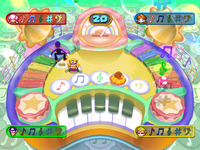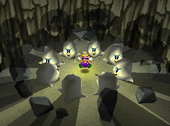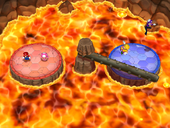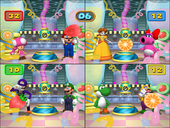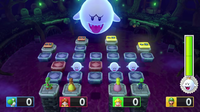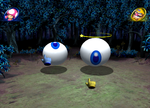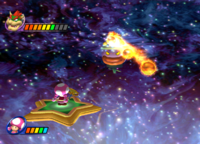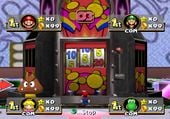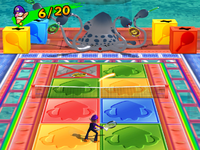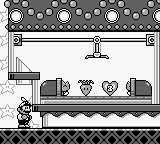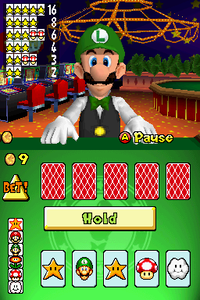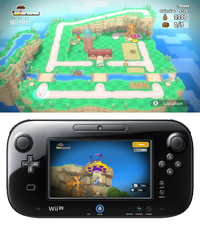Minigame: Difference between revisions
Mari0fan100 (talk | contribs) m (→Mic minigames: Better wording.) |
Technetium (talk | contribs) Tag: Mobile edit |
||
| Line 681: | Line 681: | ||
*[[Ashley (minigame)|Ashley]] | *[[Ashley (minigame)|Ashley]] | ||
*[[Taxi (minigame)|Taxi]] | *[[Taxi (minigame)|Taxi]] | ||
*[[Pirates]] | *[[Pirates (minigame)|Pirates]] | ||
*[[Bowling]] | *[[Bowling]] | ||
*[[Bird (minigame)|Bird]] | *[[Bird (minigame)|Bird]] | ||
Latest revision as of 06:19, December 23, 2024
- Not to be confused with Microgame.
A minigame (sometimes formatted as mini-game) is a short game that may reward coins, items, or higher scores. However, some main games may require the completion of a minigame to access a new area or gain a key. The most common form of minigame is from the Mario Party series.
Mario Paint minigames[edit]
Super Smash Bros. series minigames[edit]
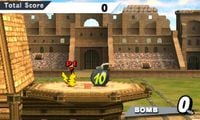
Wario Land series minigames[edit]
Wario Land II[edit]
Wario Land 3[edit]
Wario Land 4[edit]
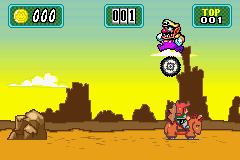
Super Mario RPG: Legend of the Seven Stars minigames[edit]
- Beetle Mania
- Moleville Mountain
- Beetle Race
- Goomba-thumping
- Midas River
- Melody Bay
- Mushroom Derby
- Sergeant Flutter race
- Grate Guy's Casino minigames
- Wheeere's Yoshi?!
Mario Party series minigames[edit]
The Mario Party series has many types of minigames. Most award ten coins, while some award items. In Mario Party, a few minigames can cause a player to lose coins, although this system was changed in later Mario Party games. Since Mario Party 2, players can now practice minigames before trying them out for real. Some minigames involve collecting coins freely, and any coins players collect are added to their coin totals afterwards; players technically cannot lose unless they do not get any coins. Some minigames can last as long as ten, five, four, three, or two minutes, but a timer does not appear until 30 or 60 seconds are left.
Minigame types[edit]
1-Player minigames[edit]
Originally featured in Mario Party, 1-Player minigames are minigames played alone. These minigames are usually accessed by landing on the Minigame Space. If the player fails, they lose five coins; if the player wins, they win 10 coins, unless it is a different kind of minigame, such as Whack-a-Plant, where the player cannot win or lose.
1-Player minigames reappear in Mario Party 8, where they are called Challenge minigames. A Challenge minigame is triggered when a player lands on a Challenge Space. If the player wins, they get to spin the wheel to throw a dart to collect the number of coins on the wedge the dart lands on. However, if the player loses, they cannot throw the dart and their turn ends. The three Challenge minigames are Pour to Score, Stampede, and Fruit Picker.
1-vs.-3 minigames[edit]
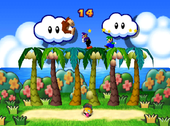
1-vs.-3 minigames are minigames that challenge a single player against the other three. They typically come in three forms: the team players trying to take down or hinder the solo player, the solo player trying to take down or hinder the other three players, or both the solo and team players trying to achieve a similar goal, with the solo player usually getting some form of advantage. In Mario Party 9, these minigames are called 1-vs.-Rivals minigames.
2-vs.-2 minigames[edit]
2-vs.-2 minigames are minigames that have the player paired up with another player. Players often need to work together and cooperate to beat these minigames. Mario Party 9 is the only Mario Party game (not counting Mario Party Advance) not to feature this category of minigames, but Shell Soccer qualifies as a 2-vs.-2 minigame.
4-Player minigames[edit]
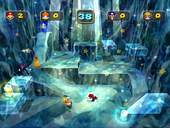
4-Player minigames are minigames that pit all four players against each other. In Mario Party, the two games Key-pa-Way and Running of the Bulb require the four players to work together, and if they succeed, they all get coins. However, this concept has not been used in any other Mario Party game, and instead, there are now only versus games; however, games in which players simply have to achieve an objective to win and are not actually competing with each other (allowing each player to win), such as Granite Getaway and Trash Landing, do exist.
This system has remained unchanged since the first Mario Party; however, in Mario Party 9, 4-Player minigames are renamed Free-for-All minigames, as this title features the option of only two or three characters (human-controlled or otherwise) competing in the Party and Minigame modes. Super Mario Party reverts the category to its original name.
8-Player minigames[edit]
8-Player minigames are minigames in Mario Party 7. They are played with eight players, in four teams of two. With the Nintendo GameCube not having eight controller slots, this must be done by having four controllers plugged in and each player sharing half of the controller. The first player of each team uses ![]() and
and ![]() , while the second player of each team uses
, while the second player of each team uses ![]() and
and ![]() . These minigames are accessible only in 8-Player parties.
. These minigames are accessible only in 8-Player parties.
Battle minigames[edit]
- "Battle Game" redirects here. For the mode in the Super Mario All-Stars version of Super Mario Bros. 3, see Battle Game (Super Mario All-Stars).
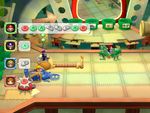
Battle minigames (also known as Battle Games) are minigames that take coins from all the players, then give them back in different quantities based on the results. The number of coins taken can go from 10 (later five) to 50 coins per player. Unlike in other minigames, the rank order is important—a player can still win some coins for being in second place. Like the 4-Player minigames, most minigames are evenly matched between the four players. From Mario Party 2 until Mario Party DS, these minigames are unique from the other 4-Player minigames. However, in all other games where Battle minigames can happen, the minigame played is simply one of the regular 4-Player minigames.
In Mario Party 2, Mario Party 3, Mario Party 4, and Mario Party 9, Battle minigames are played when a player lands on a Battle Space. From Mario Party 5 until Mario Party DS, Battle minigames are not triggered for landing on any particular space (except for landing on a Battle Space in Mario Party 6's Solo Mode) but instead played at the end of a turn, like a normal minigame. Here, players are able to vote on which Battle minigame they want to play, out of a list of three Battle minigames, except in Mario Party 8 and Mario Party DS, in which minigames are shown on a wheel, and one is randomly selected. The minigame that gets the most votes after each player has voted is the one played. If there is a tie in the votes between two minigames, the minigame with no votes is played instead. Starting in Mario Party Superstars, Battle Spaces return as VS Spaces, landing on these spaces now provide the player who landed on it three coins, however they otherwise function identically, though the Battle minigames themselves are now referred to as VS minigames instead.
The scoring for Battle minigames up to Mario Party 5:
- 1st: 70% of the total no. coins; 50% for tie; 33% for three-way tie; 25% if all players win/lose
- 2nd: 30% of the total no. coins; 15% for tie; 10% for three-way tie
If the total number of coins is not a multiple of 10, one random player gets a bonus coin.
Starting in Mario Party 6, the scoring was changed slightly:
- 1st: 70% of the total
- 2nd: 25% of the total
- 3rd: 5% of the total
- 4th: 0% of the total
In Mario Party DS, there are some big changes. Depending on the turn number ranging from two to 30, the players can pay up to 60 coins, and the scoring is a bit different from the scoring in the previous installments. The reward distribution is as follows:
- 1st: 65% of the total
- 2nd: 30% of the total
- 3rd: 5% of the total
- 4th: 0% of the total
In Mario Party 9, players can engage in a battle minigame by landing on the "Battle Minigame" space. Once a player has done so, a Hammer Bro comes and takes three Mini Stars from each player.
- 4-Player Battle:
- 1st: (50%) 6 Mini Stars
- 2nd: (33.3%) 4 Mini Stars
- 3rd: (16.7%) 2 Mini Stars
- 4th: 0 Mini Stars
- 3-Player Battle:
- 1st: (66%) 6 Mini Stars
- 2nd: (33%) 3 Mini Stars
- 3rd: 0 Mini Stars
Sometimes landing on the space mentioned above causes a Fire Bro to appear. The Fire Bro only makes last place lose 10 Mini Stars, while the winners split the 10 of the results:
- 4-Player Battle:
- 1st: +5 Mini Stars; +4 for tie; +3 for three-way tie; +9 if three players tie for last place; +6 if two players tie for 2nd place or last
- 2nd: +3 Mini Stars; +2 for tie
- 3rd: +2 Mini Stars
- 4th: −10 Mini Stars; −5 Mini Stars for tie; −3 for three-way tie
- 3-Player Battle:
- 1st: +7 Mini Stars; +5 for tie; +10 if two players tie for last
- 2nd: +3 Mini Stars
- 3rd: −10 Mini Stars; −5 for tie
Also, if a player lands on a Bowser Space, the players can be forced into battling for half of each player's Mini Stars. However, Bowser keeps any leftover Mini Stars.
- The payout goes as follows:
| Position | 3 players | 4 players |
|---|---|---|
| 1st | 75% | 50% |
| 2nd | 25% | 30% |
| 3rd | 0% | 20% |
| 4th | - | 0% |
In Mario Party 10, players can engage in a battle minigame in three different ways.
- After the mini-boss is defeated, a regular battle minigame can be triggered by landing on a Minigame Space. Upon the player hitting the minigame box and having the box show two hammers, a Hammer Bro comes and takes five Mini Stars from each player.
- In a 4-Player Battle:
- 1st: (50%) 10 Mini Stars
- 2nd: (30%) 6 Mini Stars
- 3rd: (20%) 4 Mini Stars
- 4th: 0 Mini Stars
- In a 3-Player Battle:
- 1st: (66.7%) 10 Mini Stars
- 2nd: (33.3%) 5 Mini Stars
- 3rd: 0 Mini Stars
- In a 2-Player Battle:
- 1st: (100%) 10 Mini Stars
- 2nd: 0 Mini Stars
- In a 4-Player Battle:
- If someone lands on a Bowser Jr. Space while playing Mario Party mode, one of the four options in the roulette is for all players to battle for 10 Mini Stars. Bowser Jr. distributes the Mini Stars depending on how well each player does.
- In a 4-Player Battle:
- 1st: (65%) 26 Mini Stars
- 2nd: (25%) 10 Mini Stars
- 3rd: (10%) 4 Mini Stars
- 4th: 0 Mini Stars
- In a 3-Player Battle:
- 1st: (66.7%) 20 Mini Stars
- 2nd: (23.3%) 7 Mini Stars
- 3rd: (10%) 3 Mini Stars
- In a 2-Player Battle:
- 1st: (100%) 20 Mini Stars
- 2nd: 0 Mini Stars
- In a 4-Player Battle:
- If someone lands on a Bowser Space while playing Mario Party mode and the roulette stops on "Battle for half of your Mini Stars," Bowser takes half of everyone's Mini Stars and distributes them depending on how well each player does.
- The payout goes as follows:
| Position | 2 players | 3 players | 4 players |
|---|---|---|---|
| 1st | 100% | 75% | 60% |
| 2nd | 0% | 25% | 30% |
| 3rd | - | 0% | 10% |
| 4th | - | - | 0% |
- Like in Mario Party 9, if there are not enough Mini Stars to wager in for the battle, extra Mini Stars are always provided.
- Unlike in Mario Party 9, battle minigames can also appear when there are only two players instead of three or four players. Also, any ties are always decided by dice rolls.
In Mario Party Superstars, the scoring was once again changed slightly:
- 1st: 70% of the total
- 2nd: 20% of the total
- 3rd: 10% of the total
- 4th: 0% of the total
Boss minigames[edit]
Boss minigames (also called boss battles) appear in Mario Party 9, Mario Party 10, Mario Party: Star Rush, and Super Mario Party Jamboree. In Mario Party 9, Mario Party 10, and Mario Party: Star Rush, they are played when the players reach a Boss Battle Space. Each board in Mario Party 9 and Mario Party 10 features two bosses, while five of the seven boards in Super Mario Party Jamboree have one boss each. In these minigames, players must defeat an enemy by working together (except in Diddy's Banana Blast and DK's Banana Bonus), though each one tries to get more points than the others. These minigames have five-minute time limits (with the exception of Jamboree, where all boss battles can last as long as three to five minutes) and end only when the boss health meter is empty. When half of the health meter is empty, the boss develops more diverse ways to attack. Whoever lands the final hit on the boss receives bonus points.
In Mario Party 10, any tie in a mini-boss or boss battle is always decided by a dice roll if the minigame is played during the Mario Party mode.
In Super Mario Party Jamboree, boss minigames can appear in the main Mario Party mode only through VS Spaces, functionally making them similar to the unique Battle minigames in previous games. They also appear in the Party-Planner Trek mode, where they must be played after enough Mini Stars are obtained to move on to the next board.
Mario Party DS and Mario Party: Island Tour also feature boss minigames, though they are one-to-one showdowns; in the latter, boss minigames can be played in Bowser's Tower.
Bowser minigames[edit]
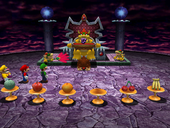
Bowser minigames are Bowser's own minigames. Bowser minigames are often extremely unfair to the players, as Bowser makes all the rules. Bowser minigames are also similar to 4-Player and 1-vs.-3 minigames (where the 1 is the player who lands on the Bowser Space), except that they produce a loser instead of a winner. The loser can lose coins, Stars (if they have one, or more), or items.
In Mario Party, players compete against each other in a 4-Player or 1-vs.-3 minigame where each player that loses must hand over somewhere between 10 to 50 coins. If there are no losers due to the game not ending in the time limit, Bowser steals coins from either the player who landed on his space or everyone.
In Mario Party 4, players compete against each other in a special 4-Player minigame. The losing player loses either half or all of their coins, or all of their items.
In Mario Party 5, Mario Party 6, and Mario Party 7, each player must survive attacks from Bowser and/or Koopa Kid (in Mario Party 7) in a given time limit, and each player that does not survive loses. Each loser in the minigames loses either half or all of their coins, all of their items (in Mario Party 5 and Mario Party 6), or a Star (in Mario Party 7). Also in Mario Party 7, there are single-player Bowser minigames, where the one player who lands on the Bowser Space has to do various things to collect a key to escape from a dungeon before the time limit runs out. The penalty for losing is the same as in the multiplayer Bowser minigames.
In Mario Party 9, Bowser's minigames are referred to as Reverse Minigames, where the player has to get last place in order to win Mini Stars.
In Mario Party 10, Bowser minigames are referred to as Bowser Battles. Hearts can be lost there. Reverse Minigames from Mario Party 9 also return in this game. If someone gets last place, they win 20 Mini Stars.
In Mario Party Superstars, Bowser minigames return as one of the events that could occur when a player lands on a Bowser Space. Each player that fails the minigame loses 10 coins.
In Super Mario Party Jamboree, while there are no traditional Bowser minigames, the Koopathlon mode features 20-player Survivathon minigames, which function similarly to Bowser minigames in other games. Like in other games, they are often intentionally unfair to the players and the goal is to simply survive.
Bowser Jr. minigames[edit]
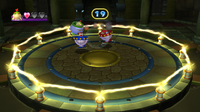
Featured in Mario Party 9, Bowser Jr. minigames are played only when a player lands on a Bowser Jr. Space. These minigames involve two players, a captain and a partner, competing against Bowser Jr. If the players win, they get five Mini Stars each. If they lose, Bowser Jr. steals five Mini Stars each. Bowser Jr. minigames also appear in Mario Party 10. They can be activated only by selecting them from Bonus Games or landing on an Event Space on the Bowser Board in amiibo Party. Players who win get 10 coins or a Star, and players who lose must pay 10 coins. Unlike in Mario Party 9, players who face Bowser Jr. do not receive a partner.
Coin Chaos minigames[edit]
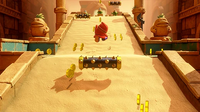
Appearing in Mario Party: Star Rush and Super Mario Party Jamboree, Coin Chaos minigames are single-player minigames that revolve around collecting as many coins as possible in a time limit. They are integral to the Coinathlon and Koopathlon modes in their respective games, in which collecting coins in minigames allows players to advance on the board. In Super Mario Party Jamboree, they are known as Coin minigames.
Co-op minigames[edit]
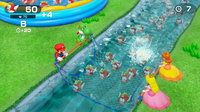
Featured in Super Mario Party and Super Mario Party Jamboree, Co-op minigames are minigames where the players must work together in order to win. In Super Mario Party, they are four-player minigames that are played mainly in the River Survival mode. In Super Mario Party Jamboree, they are eight-player minigames known as Kaboom-Squad minigames, as they are exclusively played in the Bowser Kaboom Squad mode.
Donkey Kong minigames[edit]
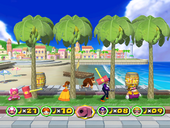
Introduced in Mario Party 5, Donkey Kong minigames are minigames run by Donkey Kong, which are often short. They usually have players focus on collecting as many bananas as possible. After a Donkey Kong minigame is finished, players can trade their bananas to Donkey Kong for coins. They can also gain more depending on the DK Roulette.
Three single-player Donkey Kong minigames appear in Mario Party 7: Jump, Man; Vine Country; and A Bridge Too Short. During the Party Cruise, if a player lands on a DK Space and is asked to beat Donkey Kong in a single-player Donkey Kong minigame, their reward can be 20 coins, 30 coins, or a Star, depending on what the roulette stops on. If Donkey Kong wins, the player gets nothing.
During the Solo Cruise, the reward for a Star for beating a single-player Donkey Kong minigame is replaced by 10 coins.
Duel minigames[edit]
First appearing in Mario Party 2, Duel minigames are minigames that involve two players playing against each other. Most usually have high stakes. They are the only type of minigame in any 1-vs.-1 game mode. The challenging player can choose to play for either coins or Stars. This is provided that the challenging player themselves has enough to wager. From Mario Party 7 onwards, the winner's prize is decided by a roulette wheel.
- In Mario Party 7, the winner decides what to take from the loser through the Slot of Stupendousness. The loser gives either coins, Stars, or nothing to the winner, depending on what the roulette stops on.
- If the roulette lands on an "X," nothing happens.
- If the roulette lands on a coin with the number ten on it, the loser must give ten coins to the winner. The loser must forfeit all of their coins if they have ten coins or fewer.
- If the roulette lands on two coins, the loser must give half of their coins to the winner. If the loser has an odd number of coins, the upper portion is taken.
- If the roulette lands on three coins, the loser must give all of their coins to the winner.
- If the roulette lands on a Star with either the number one or two on it, the loser must give one or two of their Stars to the winner, respectively. Duelers cannot bet Stars in Windmillville due to its unorthodox method of collecting Stars.
- The Slot of Stupendousness is not used if both players tie in the minigame.
- If the loser must give coins or Stars to the winner but does not have any coins or Stars to give, nothing happens.
- In Mario Party 8, the winner decides what to take from the loser with the Dart Wheel. The loser usually gives coins to the winner, but in rare cases, the loser can also give a Star or two to the winner. Nothing happens if both players tie or if the loser cannot give coins or Stars to the winner.
- VS Spaces appear in Star Battle Arena and Duel Battles and always pit the two players competing in the match against each other. The loser must give either one, five, or ten coins to the winner (if the loser is the attacker) or five, ten, or 20 coins to the winner (if the loser is the defender), depending on what the dart lands on. Unlike in Battle Royale and Tag Battle, the loser never gives Stars to the winner.
- During Battle Royale and Tag Battle, Duel minigames are triggered when a player uses Duelo Candy, a candy that lets the player roll two Dice Blocks and then duel with the first player they meet. If more than one player is on the same space, the player can choose whom to duel with. Like in Star Battle Arena and Duel Battles, the winner uses the Dart Wheel to determine what the loser must give to the winner. Unlike in Star Battle Arena and Duel Battles, the winner can also make the loser give a Star or two to them, although this occurs less frequently than the loser's giving coins to the winner. The loser can give Stars to the winner only if the attacker wins; if the defender wins, the loser gives just between one to 20 coins to the winner, depending on how many coins the loser has.
- During Battle Royale and Tag Battle, Duel minigames cannot occur in Koopa's Tycoon Town due to its unorthodox method of collecting Stars.
In Mario Party Superstars, Duel minigames return to functioning as they do in earlier appearances, where players wager coins instead of the prize being randomly chosen. However, it is not possible to duel for Stars in this game. The ability to duel for Stars returns in Super Mario Party Jamboree; however, it is possible to duel for Stars only when playing with Pro Rules or by using the Super Dueling Glove item.
Game Guy minigames[edit]
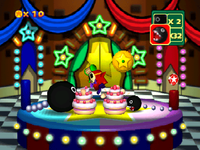
Appearing only in Mario Party 3, Game Guy minigames are minigames run by Game Guy. These minigames are played upon a player landing on a Game Guy Space. These mostly luck-based minigames determine if the player takes the coins back doubled (or more, depending on the minigame) or if they lose them all.
Item minigames[edit]
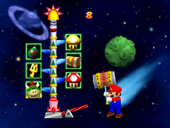
Item minigames are games that a player can play to get an item. They are triggered by landing on an Item Space. If the player gets Baby Bowser, they get nothing. Item minigames appear in Mario Party 2 and Mario Party 3. In Mario Party 2, the minigame played depends on what board is being played on. In Mario Party 3, the Item Space may trigger a roulette to decide a minigame to be played. Item minigames return in Mario Party Superstars, where they are picked randomly upon a player reaching an Item Space. Also, Baby Bowser is replaced by Bowser Jr. Item minigames reappear in Super Mario Party Jamboree. However, they are not guaranteed to be played when a player lands on an Item Space, as they are played only if the roulette that appears when the player lands on the space lands on a minigame icon. Also, obtaining an item is always guaranteed, as Bowser Jr. does not appear, nor does any equivalent. The below table displays information pertaining to which Item minigame is played on which board in Mario Party 2.
| Board | Minigame played |
|---|---|
| Pirate Land | Roll Out the Barrels |
| Western Land | Give Me a Brake! |
| Space Land | Hammer Slammer |
| Mystery Land | Mallet-Go-Round |
| Horror Land | Coffin Congestion |
| Bowser Land | Bowser Slots |
Last minigame[edit]
Being a category found only in Mario Party 8, the Last category features only one minigame, Superstar Showdown, which is played at the end of Star Battle Arena. The minigame plays out similarly to the boss minigames in Mario Party DS and Mario Party: Island Tour, as it involves the player fighting against Bowser one-on-one.
Mic minigames[edit]
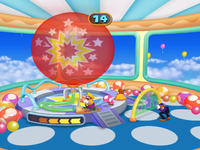
First appearing in Mario Party 6, Mic minigames are minigames that utilize the Nintendo GameCube Microphone when they are played. In Mario Party 6, five different Mic minigames appear, with all of them being 1-vs.-3 minigames. In these minigames, the solo player says a variety of commands with the microphone to try to win against the team of three. A separate mode, known as Mic Mode, is also found in Mario Party 6, in which players can play extra minigames using the microphone that they are unable to play in Party Mode or Minigame Mode. If there is no microphone inserted, there is an option for players to play Mic minigames by using the GameCube Controller like a microphone instead of using the microphone itself. Pressing the ![]() button on the controller opens up a blue box of commands; the player can select which command they want to do by using the control stick to navigate. Mic minigames cannot appear if the microphone is turned off.
button on the controller opens up a blue box of commands; the player can select which command they want to do by using the control stick to navigate. Mic minigames cannot appear if the microphone is turned off.
Mic minigames reappear in Mario Party 7. This time, 10 different Mic minigames appear, with five of them being 1-vs.-3 minigames and the other five being 4-Player minigames. In addition to the 10 Mic minigames, there is also a special Mic minigame that can be played only if the player lands on a Mic Space during Party Mode. Here, the player can wager the number of coins they have (up to 99) and double the number of coins they wager. In the special Mic minigame, three to five cards appear, each with a different type of fruit. In order to win the Mic minigame and double the coins wagered, the player must guess all of the fruits on each card correctly. If the player does not guess the fruit on a card within the given time limit or makes a wrong guess, the Mic minigame ends, and the player loses their wager. The Mic minigames function as they did in Mario Party 6.
While Mario Party DS, Mario Party: Island Tour, Mario Party 10, Mario Party: Star Rush, and Mario Party: The Top 100 all feature Mic minigames, they are treated as regular minigames in those games. However, they are distinct in that they are usually able to be toggled on or off, like in previous games.
Mini Mini-Games[edit]
Mini Mini-Games are a type of minigame in Mario Party 4. They can be played only by a character that has the effects of a Mini Mushroom via tiny pipes that lead to secret passageways on all of the boards. There are two types of Mini Mini-Games: those that involve winning items, such as Item-Go-Round and Item Poker, and those that involve winning coins, such as Coin Slots and Tropical Fishing. The themes are usually paired with the theme of the board (such as Goomba Poker and Card Matching on Goomba's Greedy Gala).
Motion minigames[edit]
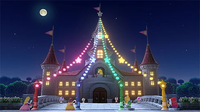
Motion minigames appear in Super Mario Party Jamboree. They are minigames that require the use of Joy-Con to perform specific tasks. These minigames are optional in all modes in which they are playable. All players are required to use a single Joy-Con controller each. Rosalina's Radical Race is the only Showdown minigame that is classified as a Motion minigame, which makes Rosalina the only Jamboree Buddy exclusive to games with Motion minigames turned on. Roll with It and Fast Fishing are also the only Item and Duel minigames, respectively, to be classified as Motion minigames.
While Mario Party 8, Mario Party 9, Mario Party 10, and Super Mario Party all feature motion-controlled minigames, they are treated as regular minigames in those games.
Rare minigames[edit]
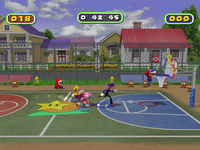
Introduced in Mario Party 3, Rare minigames are special minigames that do not appear at all in normal Party Mode. They are sometimes very long and have special options that other minigames do not have. These minigames return in Mario Party 6 and Mario Party 7 under the same name, though similar minigames are featured in side modes in other games in the series: the Extra Room in Mario Party 4, the Bonus Room in Mario Party 5, the Extras Zone in Mario Party 8, Puzzle Mode in Mario Party DS, the Extras in Mario Party 9, the Bonus Games in Mario Party 10, and Toad's Rec Room in Super Mario Party. In Mario Party: Island Tour, such minigames are categorized under the "Puzzle" and "Extras" categories. In Mario Party: The Top 100 and Mario Party Superstars, returning minigames of this category appear in the "Special" and "Sports & Puzzles" categories, respectively.
Rhythm minigames[edit]
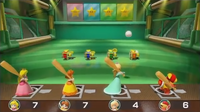
Featured in Super Mario Party and Super Mario Party Jamboree, Rhythm minigames are four-player minigames where the players gain points by performing actions to the rhythms of songs that play during the minigames. Perfect timing earns the player three points, while early or late inputs are worth just one point. In Super Mario Party, each player has separate points from each other and whoever scores the most points wins. In Super Mario Party Jamboree, this is changed so that they are purely cooperative, with all players contributing to the same point counter.
Showdown minigames[edit]
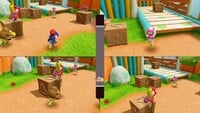
Showdown minigames appear in Super Mario Party Jamboree and can be played to earn Jamboree Buddies. They are four-player minigames that are typically longer than regular four-player minigames, often being split into multiple parts or having many small back-to-back challenges. These minigames are themed after each respective character that can appear as a Jamboree Buddy while also featuring them in a non-playable capacity. In Minigame Bay, if the player chooses to play as the specific character of a Showdown minigame, the non-playable character appears to be a grayed-out version, and the ally in question will not cheer for the winner. The first player to reach the Jamboree Buddy on the board is given an advantage over the other players that is specified before the minigame starts.
Story minigames[edit]
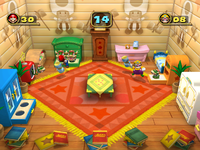
Being a category found only in Mario Party 4, Story minigames are minigames that are played in the game's Story Mode to win the player character's present in the Present Room.
Team minigames[edit]
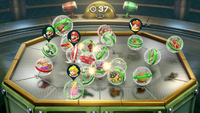
Featured only in Super Mario Party, Team minigames are four-player minigames in which each player's allies also participate. The more allies a player has, the more of an advantage they have over other players.
Mario Party minigame lists[edit]
- Mario Party – 50 minigames
- Mario Party 2 – 65 minigames
- Mario Party 3 – 71 minigames
- Mario Party 4 – 62 minigames
- Mario Party 4 (Flash game) – 10 minigames
- Mario Party-e – 11 minigames
- Mario Party 5 – 75 minigames
- Mario Party 6 – 82 minigames
- Mario Party 7 – 88 minigames
- Mario Party 8 – 73 minigames
- Mario Party 9 – 81 minigames
- Mario Party 10 – 73 minigames
- Mario Party Advance – 50 minigames
- Mario Party DS – 73 minigames
- Mario Party: Island Tour – 81 minigames
- Mario Party: Star Rush – 53 minigames
- Mario Party: The Top 100 – 100 minigames
- Super Mario Party – 84 minigames
- Mario Party Superstars – 105 minigames
- Super Mario Party Jamboree – 112 minigames
Trivia[edit]
- Super Mario Party Jamboree has the most minigames, at 112 minigames. Not counting Mario Party: The Top 100 and Mario Party Superstars (which are compilations of 100 and 105 returning minigames, respectively), Mario Party 7 has the second-highest number of minigames, at 88 minigames.
- Unless Mario Party-e, which is a card game that utilizes the e-Reader for short minigames, is counted, Mario Party and Mario Party Advance are tied at last place with the fewest minigames, at 50 minigames. The second-to-last is Mario Party: Star Rush, with 53 minigames.
- A total of 1,399 minigames is found in the Mario Party series, including returning minigames in Mario Party 2, Mario Party: The Top 100, Mario Party Superstars, and Super Mario Party Jamboree. Not including the returning minigames, the total is 1,163 minigames.
WarioWare series minigames[edit]
Despite its focus on short microgames, the WarioWare series additionally features a small number of long-form minigames in each installment, which are played separately from the microgame sets and take the form of either simple endless games where the goal is to improve one's high score or competitive multiplayer. They are typically unlocked by beating a score target in the character stages, which is indicated in the character's story mode description.
WarioWare, Inc.: Mega Microgame$! minigames[edit]
Single Player[edit]
Dual-Player[edit]
WarioWare: Twisted![edit]
Minigames are accessible from "Games" category of souvenirs.
WarioWare: Smooth Moves[edit]
Single-player[edit]
All minigames are unlocked by progressing through the game, with the exception of Pyoro S, which requires unlocking every microgame.
Multi-player[edit]
WarioWare Gold minigames[edit]
Minigames are accessible from the "Minigames" category of souvenirs.
- Pyoro
- Super Pyoro
- Mewtroid
- Mewtroid 2: Return of Sameow
- Micro Golf Open (1-2 players)
- Micro Golf Tour
- Pro Bowl (1-2 players)
- Autograph!
- Game & Watch: Manhole
- Pumpkin Panic
- Memory Match
- Root Awakening (2-4 players)
- Sew Tricky
- Foiled!
WarioWare: Get It Together! minigames[edit]
Minigames are accessible from the Variety Pack.
Completionist[edit]
- Gotta Bounce (1-4 players)
- Daily Grind (1-4 players)
- Friendless Battle (1 player)
Party[edit]
- High Five (1-4 players)
- Sly Angle (2-4 players)
- Frenemy Frenzy (2-4 players)
WarioWare: Move It! minigames[edit]
Both minigames can be played with one or two players.
Donkey Kong 64[edit]
- See also: Bonus Area
- Jetpac
- Donkey Kong arcade game
Mario Tennis series minigames[edit]
The games in the Mario Tennis series have all had minigames of some sort, with most being tennis-based, although there are some exceptions.
Mario Tennis (Game Boy Color)[edit]
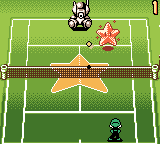
- Shooting Stars
- Target Shot
- Banana Bunch
- Boo Blast
- Perfect Shot
- Fruit Factory
- Treasure Box
- Medallion Match
- Two-On-One
Mario Power Tennis[edit]
- Artist On the Court
- Balloon Panic
- Chain-Chomp Challenge
- Gooper Blooper Volley
- Mecha-Bowser Mayhem
- Terror Tennis
- Tic-Tac-Glow
- Coin Collectors
Mario Tennis: Power Tour[edit]
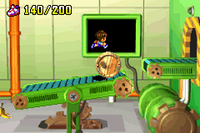
Mario Tennis Open[edit]
Mario Tennis: Ultra Smash[edit]
Mario Tennis Aces[edit]
Super Mario series minigames[edit]
Super Mario Land 2: 6 Golden Coins[edit]
Super Mario Land 2: 6 Golden Coins has two minigames that are playable at the Goal after the player hits the Bell at the end of a level. One of two games will be played: one being a crane game where the player must pick up an item, and the other being a ladder game where the player must hit a block to receive an item.
Super Mario 64 DS minigames[edit]
Super Mario 64 DS features a grand total of 36 minigames, which are divided among the game's four playable characters. Two of each character's minigames are unlocked along with the characters themselves, while the remainder are unlocked by catching rabbits. All of the minigames utilize the Nintendo DS's Touch Screen.
Yoshi's games[edit]
Yoshi's minigames are puzzle-based.
- Wanted!
- Loves Me...?
- Hide and Boo Seek
- Puzzle Panel
- Boom Box
- Tox Box Shuffle
- Which Wiggler?
- Mix-a-Mug
- Puzzle Panic
Mario's games[edit]
Mario's minigames are action-themed.
- Mario's Slides
- Bounce and Pounce
- Sort or 'Splode
- Trampoline Time
- Shuffle Shell
- Bounce and Trounce
- Connect the Characters
- Shell Smash
- Trampoline Terror
Luigi's games[edit]
Luigi specializes in "table" games, also known as gambling games. These minigames are the reason the Virtual Console re-release of Super Mario 64 DS received a PEGI 12+ rating in Europe.
- Memory Match
- Pair-a-Gone
- Picture Poker
- Mushroom Roulette
- Mario Slot
- Lucky Stars
- Pair-a-Gone and On
- Memory Master
- Super Mario Slot
Wario's games[edit]
Wario has the most diverse collection of minigames; almost no description applies to all of them.
- Bob-omb Squad
- Snowball Slalom
- Bingo Ball
- Coincentration
- Psyche Out!
- Slots Shot
- Lakitu Launch
- Intense Coincentration
- Giant Snowball Slalom
New Super Mario Bros. minigames[edit]
New Super Mario Bros. features minigames in much the same vein as Super Mario 64 DS. Some of the latter's minigames are copied exactly for the former; however, most of the minigames are new, and many are multiplayer, something never seen in Super Mario 64 DS's games. Most of the minigames' HUDs also have most of the characters lowercase.
Vs. Battle[edit]
Action[edit]
Puzzle[edit]
Table[edit]
1 on 1[edit]
- Vs. Mario's Slides
- Bob-omb Sudden Death
- Jumping Brothers
- Lakitu Launch
- Jumping Sudden Death
- Vs. Trampoline Time
- Bob-omb Trampoline
- Vs. Pair-a-Gone
1 Player[edit]
Action[edit]
Puzzle[edit]
Table[edit]
Variety[edit]
Super Mario Galaxy minigames[edit]
New Super Mario Bros. Wii minigames[edit]
These appear in Toad Houses within each world:
Super Mario Galaxy 2 minigames[edit]
These are scattered across the galaxies.
Super Mario Odyssey minigames[edit]
These are scattered among the different kingdoms.
- Slots
- Koopa Trace-Walking
- Picture Match
- Jump-Rope Challenge
- RC Car Challenge
- Bound Bowl Grand Prix
- Beach Volleyball
- Koopa Freerunning
- Balloon World
Nintendo Land attractions[edit]
Competitive[edit]
Team[edit]
Solo[edit]
- Yoshi's Fruit Cart
- Donkey Kong's Crash Course
- Captain Falcon's Twister Race
- Octopus Dance
- Balloon Trip Breeze
- Takamaru's Ninja Castle
Game & Wario minigames[edit]
Game & Wario is a game for Wii U that has 16 minigames. These games usually try to showcase the Wii U GamePad's capabilities. All of their titles are based off of how the original Game & Watch games had one-word names.
1-player minigames[edit]
Multiplayer minigames[edit]
Mario and Donkey Kong: Minis on the Move minigames[edit]
Mario and Donkey Kong: Minis on the Move is a Nintendo 3DS eShop-exclusive title that has four minigames. These minigames use the stylus on the bottom screen. ¾ of these minigames launch an object on the play area.
Paper Mario series minigames[edit]
Paper Mario: The Thousand-Year Door minigames[edit]
In Paper Mario: The Thousand-Year Door, there are four minigames (spelled mini-games) in the Pianta Parlor. These games require a certain card to play each one.
- Plane Game
- Paper Game
- Tube Game
- Boat Game
Super Paper Mario minigames[edit]
In Super Paper Mario, these minigames are found in the arcade on floor B1. The first three are unlocked from the start, costing 10 Flipside Tokens, while Hammer Whacker can be played once getting a golden card from Flopside. This mini game costs 20 tokens.
Paper Mario: Sticker Star minigames[edit]
In Paper Mario: Sticker Star, there is only one minigame located at Stump Glade.
Paper Mario: Color Splash minigames[edit]
Minigames are found in various places in Paper Mario: Color Splash.
- Snifit or Whiffit
- Super Roshambo
- Spinning-Door minigames
Paper Mario: The Origami King minigames[edit]
There are four minigames in Paper Mario: The Origami King.
Mario & Luigi series[edit]
Mario & Luigi: Superstar Saga / Mario & Luigi: Superstar Saga + Bowser's Minions[edit]
In Mario & Luigi: Superstar Saga and its Nintendo 3DS remake, there are 8 minigames found in the Beanbean Kingdom:
- Border Jump
- Hoohoo Spirit
- Mysterious Mine Carts
- Star 'Stache Smash
- Barrel
- Splart
- Chuckola Bounce
- Surfing minigame
Aside from the surfing minigame, all minigames must be played and completed at least once to progress.
Mario & Luigi: Partners in Time[edit]
In Mario & Luigi: Partners in Time, there are 4 minigames, two of which are found in Thwomp Caverns and the other two are found in Shroob Castle.
- The minigames in Thwomp Caverns are hosted by the Thwomp Bros.; the elder brother operates a slot machine, which involves Mario and Luigi to use the Bros. Ball to collect jewels so Baby Mario can hammer the button to stop the slots. Depending on the slots aligned and the difficulty setting, the quartet can receive various items (ranging from coins to beans) as rewards. The younger brother hosts another minigame, which involves Baby Mario and Baby Luigi using the Baby Spin on a Whirlwind. As they slowly descend to the ground, the babies must collect many jewels as possible, and depending on how many jewels they have collected, they will receive various prizes, ranging from coins to a piece of gear.
- The minigames in Shroob Castle involve using a spaceship. The first minigame involves the quartet using the Shroob Mother Ship to fire at smaller Shroob saucers to take them down, while the second minigame involves them using the Princess Shroob statue's spaceship head to fire Shroob saucers back at the Shroob Mother Ship to take it down. Both minigames require Luigi, Baby Mario and Baby Luigi to hit blocks that adjust the height of the spaceship and Mario to hit a block to fire an energy blast. In the second minigame, the spaceship the quartet are piloting have a set number of hit points, and should they lose all of them, the player will receive an instant Game Over.
Mario & Luigi: Bowser's Inside Story / Mario & Luigi: Bowser's Inside Story + Bowser Jr.'s Journey[edit]
In Mario & Luigi: Bowser's Inside Story and its remake, Mario & Luigi: Bowser's Inside Story + Bowser Jr.'s Journey, most of the minigames take place inside various locations in Bowser's body; the Arm Center, the Gut Check, the Rump Command, the Leg Outpost, the Nose Deck, the Memory Banks, and the Chest Station. At certain points in the game, Mario and Luigi must travel to those areas during specific situations:
- In the Arm Center, when Bowser performs tasks that involve the use of his arms (like pulling a heavy object), Mario and Luigi visit this area to play a minigame which requires them to hit respectively colored spark balls at Bowser's arm muscle. The player must press the appropriate buttons in tandem with the rhythm of the music, otherwise the balls may hit Mario or Luigi and cause them to lose coins. After hitting enough spark balls, Bowser's strength will increase, and if this is done enough times, Bowser will gain enough strength to complete the current task and the player can move on with the story. This area is visited four times throughout the course of the game.
- In the Gut Check, when Bowser eats a Giga-carrot as told by a Wiggler for pulling it out, Mario and Luigi go to this area to help Bowser digest the pieces of the carrot. This minigame requires the use of the stylus; the player must tap the eaten carrot pieces three times to make them disappear. One carrot piece may have a special enzyme that helps clear out the carrot pieces faster, though they get weaker over time (this is indicated when Bowser flashes as he eats the carrot). Once Bowser eats all the carrot pieces in the allotted time, the player moves on to the boss fight with the Wiggler, though if time expires before Bowser is finished, the minigame has to be repeated, with the large carrot being replaced with smaller carrots. This area is only visited once in the game.
- In the Rump Command, when Bowser is crushed by a giant object, Mario and Luigi must ride the Boats of Revival and give him an adrenaline boost so he can be revived and temporarily grow giant. The minigame plays like a top-down shooter, where the player must fire at red, green and blue adrenaline orbs to send them at Bowser's heart, filling up the "adrenameter". The red and green adrenaline orbs must be shot at with the correct brother (red for Mario and green for Luigi), and shooting them with the wrong brother will send it down towards them, costing a heart and a few coins if they are hit by it. The blue orbs can be shot at by both brothers. Once the adrenameter is filled, a large blue adrenaline orb will appear, which the player must shoot at enough times to revive Bowser. If the player loses all three of their hearts during the minigame, they will have to start it over. Like with the Arm Center, the brothers visit this area four times, and each time they clear the minigame, Bowser must fight a giant boss (Bowser's Castle, the Tower of Yikk, the Fawful Express and Super Peach's Castle of Fury).
- In the Leg Outpost, when Bowser performs tasks that involve pushing objects using his legs, Mario and Luigi visit this area to play a minigame which requires them stomping on Bowser's leg muscles to make him move faster. The player must press the correct, corresponding brother button to make Mario and Luigi press down on the muscle when they land, making Bowser push the object forward. After stomping down on each muscle a set number of times, Mario and Luigi will separate, and the player must press both brother buttons to press down on both muscles, causing Bowser to push even further forward. This area is visited two times throughout the course of the game.
- In the Nose Deck, when Bowser smells certain aroma, Mario and Luigi have to go to this area due to an odd disturbance. The minigame starts once the brothers enter a cyclone. Like with the carrot minigame, the player utilizes the stylus to launch the spinning brothers into pollen so they knock it into ten large nasal mounds on the side, turning them from blue to pink. Once enough pollen is knocked, a large mound will appear, which the brothers must spin into. Spiked pollen will start to appear after this is done, which will take away a heart from the player when they are touched, so they must be avoided while hitting the large mounds that sporadically appear from time to time. After enough mounds are hit, the minigame is over and Bowser will let out a large sneeze, which is required at certain points in the game to progress. This area is revisited three times.
- In the Memory Banks, when Bowser has to remember the combination to the safe containing the second Star Cure, Mario and Luigi visit this area to find out what the combination is. After defeating Bowser Memory M and Bowser Memory L, the brothers play a minigame where they must complete a puzzle which contains the memory of the safe's combination. Using the stylus, the player must drag and move the pieces, occasionally rotating them to the correct angle via a button on the bottom of the touch screen, in the right place to finish the puzzle.
- In the Chest Station, when Bowser is burned while he is curled up into a ball, Mario and Luigi visit this area. The minigame starts once the brothers enters a cannon in the area, sending them into a small area as a ball, which requires the player to use the stylus to bring back the brothers and fling them in a direction, causing Bowser to boost upwards in that same direction. If Bowser gets hit, he loses a few coins or a hit point, depending on the current minigame being played. This area is visited twice, the first time the brothers visit this area is when two giant fire-breathing Piranha Plants burn Bowser as he is storming Peach's Castle, and a second time when Bowser meets up with (the now-completed) Dark Bowser deeper into the castle and battles him with the spike ball technique.
Besides those minigames, the player can play the Cholesteroad minigame in the Challenge Node, where they are tested into using their acquired Special Attacks to defeat Cholesterons and earn enough points to win prizes. There are also minigames that are played outside of Bowser's body, like Broque Madame's minigame in Blubble Lake, where the player is tested into using their acquired Brawl Attacks to earn points and win points, similar to the Cholesteroad.
Mario & Luigi: Dream Team[edit]
In Mario & Luigi: Dream Team, there are four minigames played on Pi'illo Island. The first two are hosted by Broque Monsieur, take place in Pi'illo Blimport, and are only played once as part of the game's introduction. The latter two are found in other locations, and use the mechanics of specific Bros. Moves. Both of them are mandatory to play, but can also be played again.
Additionally, the Mad Skillathon has a minigame for seven of the game's Bros. Attacks, and Battle Broque Madame has a minigame for four of the game's Luiginary Attacks.
Profiles[edit]
Mario Party 2[edit]
- Wii Virtual Console manual:
- 4-Player Minigame: "If the color of the space that everyone stops on is the same, a 4-player minigame begins."
- 1-Vs.-3 Minigame: "When just one player stops on a different color, players are divided into a 1-vs.-3 minigame."
- 2-Vs.-2 Minigame: "When two players land on red and two players land on blue, players are divided into teams for the game."
- Item Minigame: "Begins when you stop on an Item Space. If you succeed, you get an item."
- Battle Minigame: "Begins when you stop on a Battle Space. A number of coins is collected from everyone, and then a minigame is played for them."
- Duel Minigame: "Begins when you use the Dueling Glove item or when two or more characters land on the same space during the last five turns. Characters on the same space select an opponent, set the number of coins to risk, and do a battle one-on-one."
See also[edit]
- Microgame
- Bonus Game
- Battle Mode, the Mario Kart series equivalent
Names in other languages[edit]
Minigame[edit]
| Language | Name | Meaning | Notes |
|---|---|---|---|
| Japanese | ミニゲーム[?] Minigēmu |
Minigame | |
| Chinese (simplified) | 小遊戏[?] Xiǎo yóuxì |
Minigame | |
| Chinese (traditional) | 小遊戲[?] Xiǎo yóuxì |
Minigame | |
| Dutch | Minigame[?] | - | |
| French | Mini-jeu[?] | Minigame | |
| German | Minispiel[?] | Minigame | |
| Italian | Minigioco[?] | Minigame | |
| Korean | 미니게임[?] minigeim |
Minigame | |
| Portuguese | Minijogo[1] | Minigame | |
| Russian | Мини-игра[?] Mini-igra |
Minigame | |
| Spanish | Minijuego[?] | Minigame |
4-Player Minigame[edit]
| Language | Name | Meaning | Notes |
|---|---|---|---|
| Dutch | Minigame voor 4[?] | Minigame for 4 | |
| French | Mini-jeu à quatre[?] | Minigame for Four | |
| German | 4-Spieler-Minispiel[?] | 4-Player Minigame | |
| Italian | Minigioco x 4 giocatori[?] | Minigame x 4 Players | |
| Portuguese | Minijogo - 4 jogadores[1] | Minigame - 4 Players | |
| Spanish | Para 4 jugadores[?] | For 4 Players |
1 vs. 3 Minigame[edit]
| Language | Name | Meaning | Notes |
|---|---|---|---|
| Dutch | 1-vs.-3-minigame[?] | 1 vs. 3 Minigame | |
| French | Mini-jeu seul contre tous[?] | Alone Against Everyone Minigame | |
| German | 1-vs.-3-Minispiel[?] | 1 vs. 3 Minigame | |
| Italian | Minigioco 1 contro 3[?] | 1-on-3 Minigame | |
| Portuguese | Minijogo de 1 contra 3[?] | 1-on-3 Minigame | |
| Spanish | 1 contra 3[?] | 1-on-3 |
2 vs. 2 Minigame[edit]
| Language | Name | Meaning | Notes |
|---|---|---|---|
| Dutch | 2-vs.-2-minigame[?] | 2 vs. 2 Minigame | |
| French | Mini-jeu 2 contre 2[?] | 2-on-2 Minigame | |
| German | 2-vs.-2-Minispiel[?] | 2 vs. 2 Minigame | |
| Italian | Minigioco 2 contro 2[?] | 2-on-2 Minigame | |
| Portuguese | Minijogo de 2 contra 2[?] | 2-on-2 Minigame | |
| Spanish | 2 contra 2[?] | 2-on-2 |
References[edit]
- ^ a b Detona (October 17, 2024). Super Mario Party Jamboree - Jornada das Tarefas - Completo 100%. Youtube. Retrieved October 23, 2024.
| Mario Party series minigame lists | |
|---|---|
| Main | Mario Party (1998, N64) • Mario Party 2 (1999, N64) • Mario Party 3 (2000, N64) • Mario Party 4 (2002, GCN) • Mario Party 5 (2003, GCN) • Mario Party 6 (2004, GCN) • Mario Party 7 (2005, GCN) • Mario Party 8 (2007, Wii) • Mario Party 9 (2012, Wii) • Mario Party 10 (2015, Wii U) • Super Mario Party (2018, Switch) • Mario Party Superstars (2021, Switch) • Super Mario Party Jamboree (2024, Switch) |
| Handheld games | Mario Party Advance (2005, GBA) • Mario Party DS (2007, DS) • Mario Party: Island Tour (2013, 3DS) • Mario Party: Star Rush (2016, 3DS) • Mario Party: The Top 100 (2017, 3DS) |
